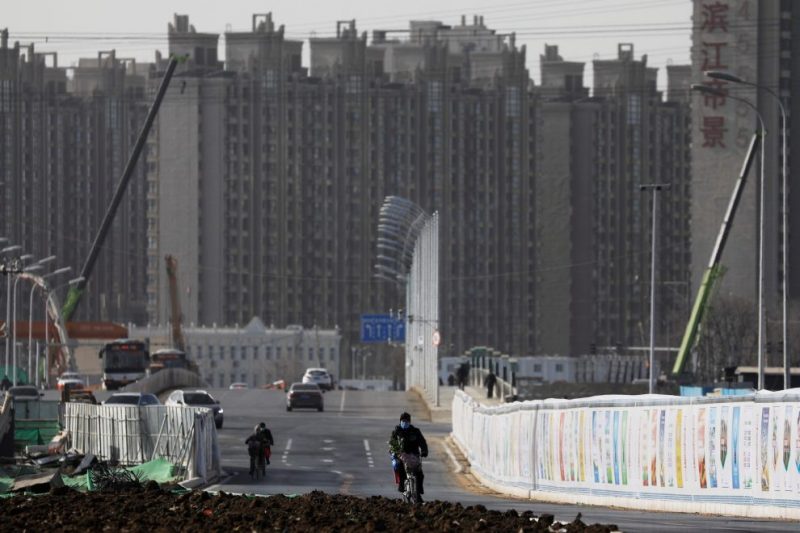Official data revealed on Wednesday confirmed that China’s post-Covid recovery in 2023 was patchy, weighed down by the property crisis intensifying, amid weak consumer demand, while deflationary risks grew.
GDP expanded by 5.2% in 2023 – slightly more than the official target, but the recovery was far shakier than many analysts and investors foresaw.
Expectations that the world’s second-largest economy would stage a strong post-Covid bounce quickly fizzled as the year progressed, with weak consumer and business confidence, mounting local government debts and slowing global growth sharply weighing on jobs, activity and investment.
“The recovery from Covid – disappointing as it was – is over,” China Beige Book International‘s latest survey said on Wednesday. “Any true acceleration (this year) will require either a major global upside surprise or more active government policy,” the private data collector said.
ALSO SEE: China Not a Risk, Premier Li Tells Davos Business Leaders
A slew of economic readings early on Wednesday suggest China lost more momentum heading into the new year, despite a flurry of government support measures.
Gross domestic product (GDP) grew 5.2% in October-December from a year earlier, data from the National Bureau of Statistics (NBS) data showed, quickening from 4.9% in the third quarter.
On a quarter-by-quarter basis, however, GDP grew 1.0%, slowing from a revised 1.5% gain in the previous quarter.
Some December indicators released along with the GDP data were more grim, suggesting the country’s protracted property crisis is deepening despite government efforts to prop up the sector.
Other data for last month showed retail sales growth slowed and investment remained tepid, with only industrial output showing some signs of improvement.
Similar growth in 2024 seen as unlikely
Policy insiders expect Beijing will maintain a similar growth target of around 5% for this year, but analysts say that may be a tall order even with additional stimulus.
Cyclical problems such as the property crisis are colliding with deep-seated structural issues such as an over-reliance on debt-fuelled investment and infrastructure, rather than steps to broaden and deepen consumption.
The head of NBS, Kang Yi, said at a press conference in Beijing that China’s 2023 growth was “hard won”, but added the economy faces a complex external environment and insufficient demand in 2024.
Stocks in China, already plumbing five-year lows, tumbled after the latest disappointing data as did Chinese firms listed in Hong Kong, while the yuan eased. The currency has come under fresh pressure recently as market expectations grow that policymakers will have to commit soon to more interest rate cuts and other support measures.
“At present, our country’s government debt level and inflation rate are both low, and the policy toolbox is constantly being enriched,” NBS’ Kang said. “Fiscal, monetary and other policies have relatively large room for manoeuvring, and there are conditions and space for intensifying the implementation of macro policies.”
Home prices fall most in 9 years in December
Analysts said stock market investors appeared most rattled by ominous real estate data on Wednesday.
China’s December new home prices fell at the fastest pace in nearly nine years, marking the sixth straight month of declines, NBS data showed. Property sales by floor area fell 8.5% for the year while new construction starts plunged 20.4%.
Debt-ridden developers have delayed construction on millions of homes according to economists’ estimates, further weighing on consumer confidence.
“I think markets were disappointed they didn’t cut interest rates on Monday, but it seems they are thinking about more targeted measures,” Woei Chen Ho, economist at UOB, said.
“The property issues are not fixed by broad-based rate cuts.”
On Monday, the central bank left the medium-term policy rate unchanged, defying market expectations for a cut as pressure on the yuan continued to limit the scope of monetary easing.
“The piecemeal rollout of support from mid-year has done little to turn things around. It’s clear that China’s economy needs extra stimulus,” Harry Murphy Cruise, economist at Moody’s Analytics, said.
“Direct support for households could be the crowbar needed to pry open wallets, but the prospect of such support has been a nonstarter for officials in recent years. Instead, monetary easing and new debt issuance for infrastructure, energy and manufacturing projects look more likely.”
Youth unemployment figure resumes, population down 2m
As businesses remained wary of adding workers in the face of many uncertainties, the nationwide survey-based jobless rate increased to 5.1% in December from November’s 5.0%, NBS data showed.
NBS also resumed the publication of youth unemployment data, which it had suspended for five months. The December survey-based jobless rate for 16-24 years olds, excluding college students, was at 14.9%, compared with a record high of 21.3% in June.
Recent data had suggested the economy was starting 2024 on shaky footing, with persistent deflationary pressures and a slight pick-up in exports unlikely to kindle a quick turnaround in lacklustre factory activity. December bank lending was also weak.
“While we still anticipate some near-term boost from policy easing, this is unlikely to prevent a renewed slowdown later this year,” Julian Evans-Pritchard, head of China Economics at Capital Economics, said.
“Although the government met its 2023 GDP growth target of ‘around 5.0%’, achieving the same pace of expansion in 2024 will prove a lot more challenging.”
Adding to concerns over China’s longer-term growth prospects, the country’s population fell for a second consecutive year in 2023. The total number of people in China dropped by 2.08 million to 1.409 billion in 2023, a faster decline than in 2022.
- Reuters with additional editing by Jim Pollard
ALSO SEE:
Country Garden Warns of ‘Severe’ Tests in China Property Market
China’s Deflation And Weak Economy Point to Another Bumpy Year
China’s Focus on Infrastructure, State Industry Squeezing Families
























